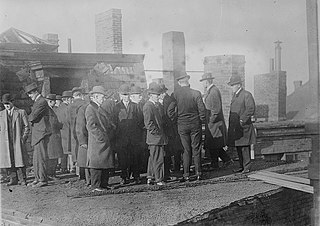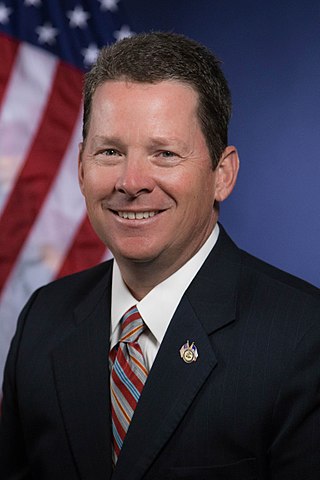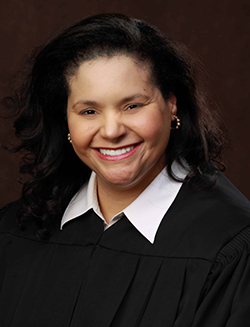
In the United States, a district attorney (DA), county attorney, county prosecutor, state's attorney, prosecuting attorney, commonwealth's attorney, state attorney or solicitor is the chief prosecutor and/or chief law enforcement officer representing a U.S. state in a local government area, typically a county or a group of counties. The exact name and scope of the office varies by state. Generally, the prosecutor represents the people of the jurisdiction and in many states their authority stems from the state constitution. Unlike similar roles in other common law judicial systems, these are elected.

A prosecutor is a legal representative of the prosecution in states with either the common law adversarial system or the civil law inquisitorial system. The prosecution is the legal party responsible for presenting the case in a criminal trial against the defendant, an individual accused of breaking the law. Typically, the prosecutor represents the state or the government in the case brought against the accused person.

United States attorneys are officials of the U.S. Department of Justice who serve as the chief federal law enforcement officers in each of the 94 U.S. federal judicial districts. Each U.S. attorney serves as the United States' chief federal criminal prosecutor in their judicial district and represents the U.S. federal government in civil litigation in federal and state court within their geographic jurisdiction. U.S. attorneys must be nominated by the President and confirmed by the Senate, after which they serve four-year terms.

The United States attorney for the Southern District of New York is the chief federal law enforcement officer in eight New York counties: New York (Manhattan), Bronx, Westchester, Putnam, Rockland, Orange, Dutchess, and Sullivan. Established by the Judiciary Act of 1789, the office represents the United States government in criminal and civil cases across the country. The SDNY handles a broad array of cases, including but not limited to those involving white collar crime, domestic terrorism, cybercrime, public corruption, organized crime, and civil rights disputes.
The structure of the judiciary of Texas is laid out in Article 5 of the Constitution of Texas and is further defined by statute, in particular the Texas Government Code and Texas Probate Code. The structure is complex, featuring many layers of courts, numerous instances of overlapping jurisdiction, several differences between counties, as well as an unusual bifurcated appellate system at the top level found in only one other state: Oklahoma. Municipal Courts are the most active courts, with County Courts and District Courts handling most other cases and often sharing the same courthouse.

The Texas Court of Criminal Appeals (CCA) is the court of last resort for all criminal matters in Texas. The Court, which is based in the Supreme Court Building in Downtown Austin, is composed of a Presiding Judge and eight judges.

Johnny Sutton is an attorney who served as United States Attorney for the Western District of Texas from 2001 until 2009, and chaired the Attorney General's Advisory Committee of United States Attorneys. Sutton is known for the prosecution of United States Border Patrol agents Jose Compean and Ignacio Ramos. He is currently a partner with the law firm Ashcroft Sutton Reyes, LLC in Austin, Texas.
The Dallas County District Attorney is the elected, or appointed by the Texas Governor in the event of a vacancy, district attorney (DA) of Dallas County, Texas. Currently, this position is held by John Creuzot, a Democrat who defeated Faith Johnson, appointed by Texas Governor Greg Abbott, after Susan Hawk resigned in 2016. The office prosecutes offenses under Texas state law classified as felonies, Class A and B misdemeanors, appeals of Class C misdemeanors, and Class C misdemeanors filed in the Justice of the Peace courts, generally by non-municipal police agencies..
This article refers to crime in the U.S. state of North Carolina.
Carol S. Vance was a former district attorney of Harris County (Houston), Texas, who served in that office from 1966 to 1979, and a former board member of the Texas Board of Criminal Justice, which governs the Texas Department of Criminal Justice. Vance was born in 1933.

Grand juries in the United States are groups of citizens empowered by United States federal or state law to conduct legal proceedings, chiefly investigating potential criminal conduct and determining whether criminal charges should be brought. The grand jury originated under the law of England and spread through colonization to other jurisdictions as part of the common law. Today, however, the United States is one of only two jurisdictions, along with Liberia, that continues to use the grand jury to screen criminal indictments.
In 2013, two prosecutors and a prosecutor's wife were murdered in Kaufman County, Texas. The case gained national attention in the United States due to speculation that the Aryan Brotherhood prison gang was responsible, but this was later found to be untrue. Eric Lyle Williams, a former lawyer and justice of the peace whose theft case was prosecuted by two of the victims, was tried, found guilty, and sentenced to death for two of the murders. He was also charged with the murder of prosecutor Mark Hasse, but a decision was made not to prosecute him as he had already received a death sentence for the other murders. His wife, Kimberly Irene "Kim" Williams, was tried separately, and sentenced to 40 years in prison.
On August 15, 2014, Texas Governor Rick Perry was indicted by a Travis County grand jury, but has since been cleared on all charges. The first charge of the indictment was abuse of official capacity, a first-degree felony, for threatening to veto $7.5 million in funding for the Public Integrity Unit, a state public corruption prosecutors department. The second charge, which has since been ruled unconstitutional, was coercion of a public servant, a third-degree felony, for seeking the resignation of Travis County District Attorney Rosemary Lehmberg, a Democrat, after she was convicted of drunk driving and incarcerated. Lehmberg was a district attorney in Travis County, Texas, and the Travis County DA's office managed the Public Integrity Unit's operations. The veto was seen as retribution for Lehmberg not stepping down. Perry pleaded not guilty to both charges.
Nellie Gray Robertson was a lawyer and jurist in Texas. She was nominated to the All-Woman Supreme Court of 1925, though she did not serve in the position. She was the first female county attorney in the state.
Pointer v. Texas, 380 U.S. 400 (1965), was a decision by the United States Supreme Court involving the application of the right of to confront accusers in state court proceedings. The Sixth Amendment in the Bill of Rights states that, in criminal prosecutions, the defendant has a right "...to be confronted with the witnesses against him; to have compulsory process for obtaining witnesses in his favor..." In this case, a person arrested in Texas for robbery was deprived of the ability to cross-examine a witness when the lower court allowed the introduction of a transcript of that witness's earlier testimony at a preliminary proceeding instead of compelling attendance by the witness at trial.

Joseph D. Brown is an American lawyer who served as the United States Attorney for the United States District Court for the Eastern District of Texas from February 26, 2018, until May 31, 2020. He was formerly the District Attorney for Grayson County, Texas. Brown served as Grayson County's District Attorney for 17 years. He previously served as an associate attorney for the law firm of Cowles and Thompson and on the state board of the Texas Juvenile Justice Department. Brown received his Bachelor of Arts from the University of Texas in 1995 and his Juris Doctor from Dedman School of Law. Brown is the son of former District Judge David Brown and the nephew of the late U.S. District Judge Paul Neeley Brown. On February 15, 2018, his nomination to become a U.S. Attorney was confirmed by voice vote. He was sworn in on February 26, 2018.
José P. Garza is an American lawyer serving as the District Attorney of Travis County, Texas since 2021.

Ada Elene Brown is a United States district judge of the United States District Court for the Northern District of Texas. She is a former trial judge of the Dallas County courts and a former Justice of the Fifth Court of Appeals of Texas. She is the first African-American woman federal judge nominated by President Donald Trump and confirmed by the Senate. She is also the first African American woman to sit as a federal judge in the 140- year-history of the Northern District of Texas. A citizen of the Choctaw Nation, Brown is also one of six actively serving Native American federal judges of 673 federal district court judges. When appointed to the federal bench, Brown became the only woman judge in the 233-year history of the Choctaw Nation to serve as a federal judge.

The 2022 Texas Attorney General election took place on November 8, 2022 to elect the Attorney General of Texas. Incumbent Republican Attorney General Ken Paxton won re-election to his third term. Paxton won all but 21 counties and won the popular vote by a margin of 9.7%, underperforming Governor Greg Abbott's concurrent bid for re-election by 1.1%.

The 2022 Texas elections were held on November 8, 2022. Primary elections were held on March 1, with runoffs held on May 24 for primary candidates who did not receive a majority of the vote.










